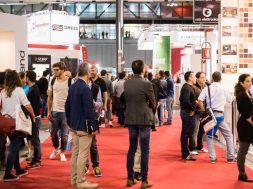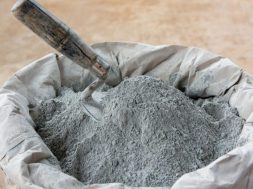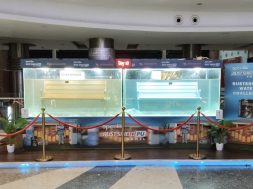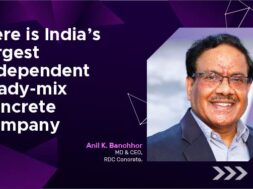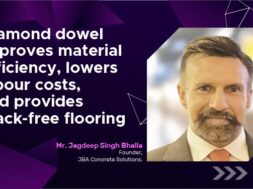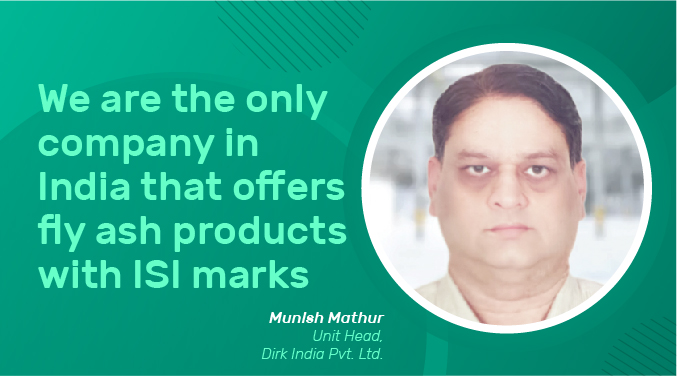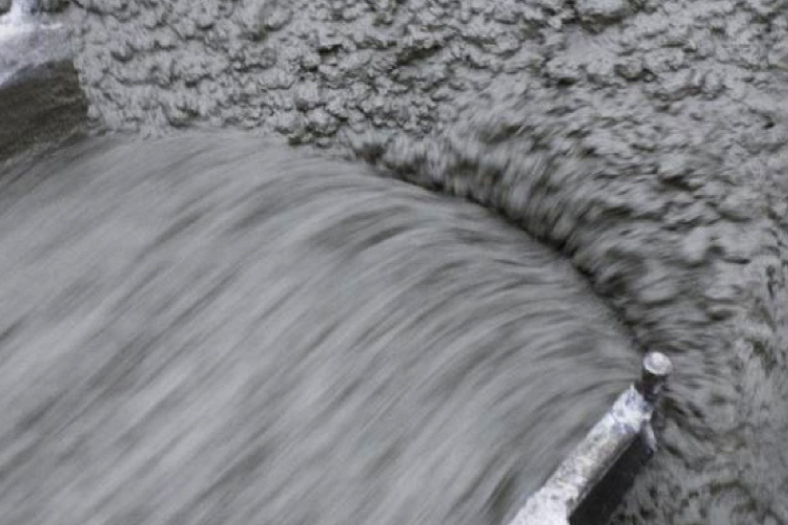
Sand-free products are a solution to the ever-rising problem of procuring quality sand.
The construction industry is one of the booming industries. The advancements in construction and the usage of high-end technologies are significantly helping the construction professionals find solutions for many day-to-day problems. Most parts of India are facing acute crisis of sand, humans are consuming sand faster than the earth’s capacity to replenish stocks.
Dyecrete by Prism
Prism Johnson supplies concrete from grade M05 to M90 throughout India. Atul Desai, Executive Director and CEO, Prism Johnson Ltd says, “We have a special concrete product segment which imparts value propositions like aesthetics, durability, time savings, man power savings etc.”
Dyecrete is a range of decorative concrete with possibilities of multiple colours and patterns to impart aesthetic value and durability to external floorings. It is resistant to wear and tear from sunrays (UV protected), hence requires minimal maintenance. One has the option of engrossing a particular symbol, character through as well. Vehicular movement is supported as it is equivalent to the highways in load bearing capacity (M30 to M40). Lifespan of Dyecrete is equivalent to design life of concrete only.
Perlcon Glazed Isoballs
Perlcon Glazed Isoballs (GIB) is a light-weight aggregate for concrete, insulation concrete. This can replace sand in specialised applications. GIB is the lightest aggregate having density from 100 kg/m3 – 150 kg/m3. This material is white or light gray in colour and is about 1/10 the weight of sand or gravel.
Sunil Chaurasia, Business Head, Perlcon Premix Pvt Ltd says, “The specially processed GIB aggregate consists of expanded particles for use in lightweight concrete, fire retardant plaster or insulating concrete in place of sand or gravel.” GIB in combination with Portland cement is the lightest of all mineral aggregate concretes. Concrete can be designed with GIB up to density of 300 kg/m3, this will reduce the deadweight of floor, roof and wall constructions.
Vadraj’s Portland Slag Cement
Portland Slag Cement (PSC) is manufactured by inter-grinding Portland cement clinker, gypsum and granulated slag from steel plants. It is also manufactured by blending OPC with GGBFS through high efficiency mechanical blenders. According to V.P. Sharma, M.D and CEO, Vadraj Cement Ltd, “The granulated slag used for manufacture of slag cement should conform to IS: 12087-1987. The slag constituent shall not be less than 25 per cent and not more than 70 per cent in PSC as per IS: 455-2015.”
Constant market growth
Market in general has yet to grasp the collateral benefits such as reduction in time, material handling, wastage, manpower reduction and above all reduction in utility costs, etc. when one is working with well formulated light weight, sand-free and self-curing materials like PERLCON products, as against other conventional products without significant value addition features.
Chaurasia from Perlcon says, “Market is growing consistently for readymix mortars, light-weight concrete, insulation plaster and insulation material as these products add significant value to construction.”
Adding value to construction
According to Desai, Prism’s sole focus is to curate products that are beneficial to its customers as well as environment friendly. Elitecrete and Perviouscrete are the most promising solution as they focus on cooling and water harvesting respectively.
• Elitecrete – Concrete solutions with density ranging from 800 to 1800 kg per cu.m offering superior thermal and sound insulation properties. If placed on the top slab in any building, one can observe temperature difference of 3-5 C with ambient temperature thereby reducing air condition usage and carbon footprints. At the same time, they reduce dead weight on structures, supporting them for earthquake resistant buildings by transferring maximum load towards the bottom (better alignment of centre of mass and centre of gravity).
• Perviouscrete – Ever wondered about solving water logging issues during peak monsoon in cities such as Mumbai where life comes to halt? Perviouscrete helps counter such problems as they have porosity as high as 35 per cent allowing water to percolate through the same and be conserved / harvested for future use.
Perlcon products are formulated without use of natural river sand or stone dust or any form of man-made sand wherein various siliceous minerals are selectively replacing the natural sand.
Chaurasia from Perlcon says, “By adopting Perlcon products, the builders are safeguarding new construction from several negative factors arising out of sand usages, such as shrinkage, severe heating and cooling cycles, efflorescence, etc. In turn, it increases the longevity and serviceability of new structure as collateral benefits.”
V.P. Sharma from Vadraj Cement explains how Portland Slag Cement can add value to construction:
• Maximum reduction in heat of hydration: Heat is liberated due to chemical reaction when water is added to cement, and it leads to development of micro-cracks due to temperature differential between surface and inside mass of concrete. Heat of hydration is effectively controlled by use of PSC.
• Low risk of shrinkage: The total shrinkage, drying plus autogenous of concrete made with PSC is 15 per cent – 20 per cent lower compared to 100 per cent Portland cement concrete.
• Improved corrosion resistance: High chloride diffusion affects the reinforcement steel and leads to premature deterioration. Concrete made with PSC leads to increase in resistivity of concrete and reduces diffusivity of chloride ions in concrete.
• Improved water tightness: Use of PSC improves the mineralogy of cement hydration products due to which the concrete becomes denser and hence, concrete becomes highly resistance to moisture penetration.
• High flexural and compressive strength: PSC has positive effect on development of strength of concrete beyond 28 days over OPC. Increase in strength at 56 days, over 28 days is about 14 to 15 per cent for PSC, while it is only 9 to 10 per cent in case of OPC.
• Environment friendly green product: PSC utilises granulated blast furnace slag, which is an industrial by-product of steel plants and reduces use of OPC clinker. It reduces carbon di-oxide footprints in atmosphere and contributes to mitigate global warming.
We have a special concrete product segment which imparts value propositions like aesthetics, durability, time savings, man power savings etc.
Atul Desai, Executive Director & CEO, Prism Johnson Ltd
Market is growing consistently for readymix mortars, light weight concrete, insulation plaster and insulation materials as these products add significant value to construction.
Sunil Chaurasia, Business Head, Perlcon Premix Pvt Ltd
Slag constituent shall not be less than 25 per cent and not more than 70 per cent in PSC as per IS: 455-2015.
V.P. Sharma, M.D. and CEO, Vadraj Cement Ltd
13
Cookie Consent
We use cookies to personalize your experience. By continuing to visit this website you agree to our Terms & Conditions, Privacy Policy and Cookie Policy.


